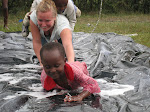Tottering First Steps
Originally planned as a 10-day training covering seven modules, the training programme was born out of a series of activities aimed at identifying the target participants’ training needs. This included conducting classroom observations for all 26 teachers at URA (an undertaking not for those who are easily bored), developing and conducting training needs surveys, (almost daily) conferencing with the Headmaster, and for good measure, finding out what the students think of how their teachers perform in class a survey.
I said “originally planned” because a few days before the implementation of the plan, I had to revise the programme to accommodate an “unforeseen” event—something that the headmaster at URA failed to advise me about as I was putting together the training plan (never mind that he knew of the dates weeks before). Yes, John Lennon was right—life is what happens to you when you’re busy making other plans… And so the 10-day training became two sets of five-day training sessions, the seven modules reduced to four with the most basic and most important topics prioritized and the rest moved to the next training in December.
Inciting Interest
Seriously, I was in too much pressure to make this training work, not just because the organization waited a long time to find the right person to head the programme but also because the teachers (who to begin with are not in the best of moods from not being paid their salaries for three months) were writing off their holiday just to attend this training. It has to be worth their while! At the onset I made it clear with everybody that the training is participatory and that I am merely a facilitator, a guide on the side. I involved them in laying out the house rules and gave them the chance to voice out their expectations. As expected, the first few hours of the first day were a bit awkward, but with the help of a warming-up energizer the mood lightened and the teachers started feeling at ease with me. Halfway through the day, I felt the pressure lift off. The participants were responding well to the group activities and were actually showing signs of enjoying.
The next days proceeded smoothly. Everyday I arrive at the venue with all of them eagerly waiting. There was never a day that we had to start late and what’s more, their participation and the quality of work they were turning in even surpassed my expectations. It must be the promise of an incentive for the best performers at the end of the training and the opportunity to be selected as a “training champion” (a plan hatched by myself and Fratern to entice the teachers to attend and participate), but I want to think that they realized the importance of the training to their professional growth. The chatter during breaks and all the laughter and passionate debates during group presentations showed that the teachers enjoyed the opportunity the training provided for them to get to know their colleagues better. The group activities planned evoked reflection on how they do things and how they can improve them. There were a lot of aha moments, a lot of reinforcing of what they already know, and most importantly, opportunities to learn from each other.

Mzee Senkondo presenting his group’s output
Mzee Senkondo have more than forty years of teaching experience, and easily the most senior of the group. One of my favorite moments in the training was getting him to dance the Hokey Pokey during an afternoon energizer, and seeing him enjoying it!

Group Superstars hard at work…

…and not to be outdone, Group Best, too!

Christina Claxton facilitating a group session on Addressing Special Educational Needs in the Classroom.

Christina, a Special Education Needs Specialist from Amani Center for Streetchildren in Moshi, agreed to facilitate the session for free and has committed to help out with the next SEN trainings!
Class photo with Christina Claxton
Big Smiles and Stout Hearts
The speeches from the participants nominated by the group to give the teachers’ response were heartwarming, the claps have that energetic lilt to it, and if you were there you would not miss the big, warm smiles on the participants’ faces when they walked up to the front to receive their certificates from Fratern and Madam Eva Mosha, the District Academic Officer. I, for my part, found hope in what the training had accomplished. Those teachers’ warm smiles and the glimmer in their eyes suggest that they are walking away from the training with fire in their hearts and renewed spirits and I am happy with that. Hearts on fire could change the world, or if not the world, at least their classrooms.

Class photo with Madam Eva Mosha of the District Education Office, Meru District, and Fratern Tarimo, TFFT Managing Director, during the awarding ceremony.

Melissa with the first batch of teachers trained under the TFFT Teachers Training Programme






No comments:
Post a Comment